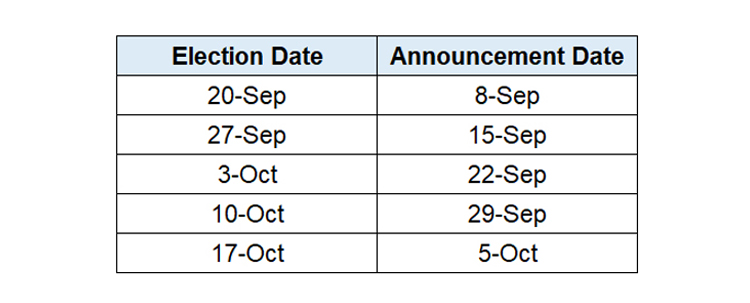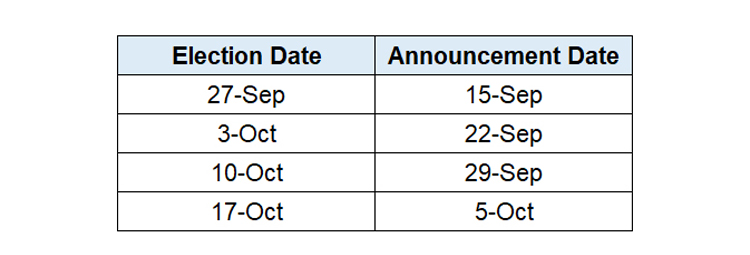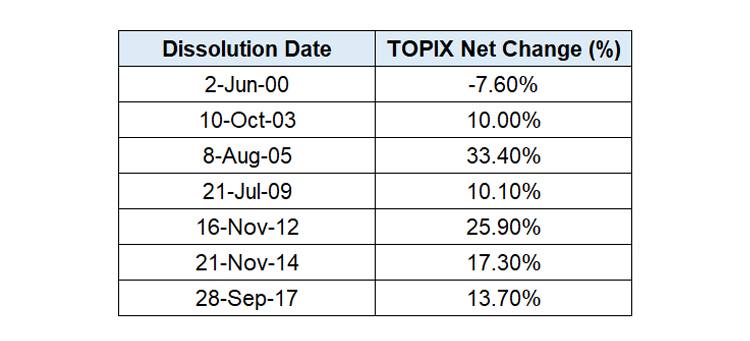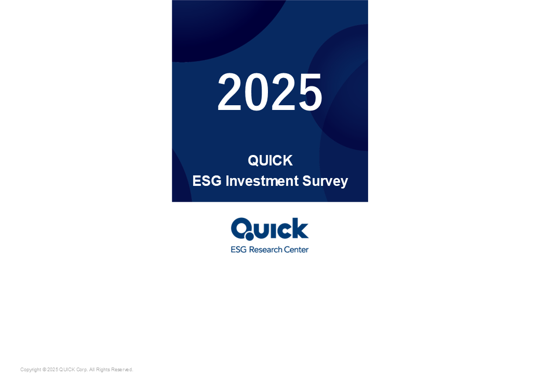Japan Markets ViewExploring Japanese Stock Market Trends from Elections
Jul 28, 2021
Many people are paying attention to, “When is the election for the House of Representatives?” We examined the impact of the election, scheduled for autumn, on the stock market.
When will the election for the House of Representatives be held?
Many people believe that the election will be held by dissolving the House of Representatives in the first half of September, after the Olympic and Paralympic Games, or after the term expires as the President of the Liberal Democratic Party (LDP) at the end of September election will be held by the expiration of the members of the House of Representatives on October 21. The focus is on the Tokyo Olympics and the status of the spread of COVID-19.
According to Mizuho Securities Co., Ltd., if the Tokyo Olympics concludes without the spread of COVID-19 and Japanese athletes perform well, the approval rating for the Suga Government may rebound and the House of Representatives may be dissolved immediately after the end of the Paralympics on September 5. On the other hand, if the number of people infected with COVID-19 surges during the Tokyo Olympics and if the Tokyo Olympics is established as a failure, then Prime Minister Suga is likely to be forced into the election until his term expires on October 21.
However, the spread of COVID-19 is still progressing, and the situation remains highly unpredictable. On July 8, the government declared a state of emergency for COVID-19 in Tokyo for the fourth time, from July 12 to August 22.
Estimated schedule of upcoming election
If the election is due to the dissolution of the House of Representatives after the Olympics, it will be one of the following dates

On the other hand, if the election is to be held in conjunction with the expiration of the term of the members of the House of Representatives on October 21, it will be within 30 days prior to the expiration of the term, therefore one of the following dates.

In either case, the next House of Representatives election is scheduled to be held by autumn.
Japanese stocks have risen six out of seven times during the elections for the House of Representatives since 2000
What is the correlation between the election and stock prices? According to a report dated June 25 by Daiwa Securities Co. Ltd., Japanese stocks have risen during 6 out of 7 elections since 2000 (TOPIX rose in 60 business days before and after the dissolution of the House of Representatives). Thus, the election this autumn is considered to be one of the events that could lead to a correction in the undervalued stocks.

Since the political and economic conditions are different in each of the past elections, it is not possible to make a general comparison. However, past experiences can still be helpful for future investments. Daiwa Securities cited a case of the 2005 election that occurred due to the dissolution in view of the rejection of the Postal Service Privatization Act. This case is a reference because of the similarities in structural reforms such as digitalization, the weaker yen, and the improving trend in the economy and business performance. Looking back at 2005, outperformance in economic-sensitive sectors with domestic demand, such as finance, real estate and construction, stood out.
In a report dated the same day, SMBC Nikko Securities Inc. pointed out that if vaccination rates were to surpass 50% in September, the most likely scenario would be that the LDP would win the election after dissolution of the House of Representatives, which is expected to be held in the same month, followed by the election of Suga as prime minister. In recent years, Japanese stocks have started to rise after the dissolution of the House of Representatives, and stock prices tended to move upward after the LDP won the election, so it cannot be taken lightly as a trigger for rising stock prices.
Vaccination for COVID-19 is now being rolled out. In a debate between party leaders on June 9, Prime Minister Suga stated that he aims to complete the vaccination process for all those who wish to be vaccinated between October and November, and this will help domestic demand to recover from the October-December period onward.
Was the Tokyo Metropolitan Assembly Election a prelude? What was the impact on the stock market?
In the Tokyo Metropolitan Assembly Election held on July 4, the LDP struggled more than expected. Although the LDP increased the number of seats from 25 to 33 and became the largest party, the party failed to achieve its goal of winning the majority of seats, together with the Komeito. In response to this result, the Tokyo stock market fell on July 5, despite the Dow Jones Industrial 30-Stock Average reaching a record high on the US stock market on July 2. Based on its disappointing results in the Tokyo Metropolitan Assembly Election, there is a strong prediction that the LDP is likely to struggle in the House of Representatives election in the autumn.
Spotlight on the progress rate of vaccination and the number of infected people
The progress rate of vaccination in Japan will be closely watched hereafter, not only in terms of the infection status of COVID-19 but also in terms of predicting the timing of the election. Vaccinations for healthcare workers and the elderly, who are given high priority, are expected to be completed by the end of July. The vaccination pace is rapidly accelerating as vaccinations for people under 64 years old have recently been rolled out at large-scale vaccination sites and workplaces.
However, the recent increase in global demand for vaccines has caused delays in the supply of vaccines to Japan. With the temporary suspension of new applications for workplace vaccinations and the cancellation of appointments by local governments, the prospect of vaccination pace seems uncertain.
Currently, there is growing concern about the spread of the Indian variant (delta variant) of COVID-19. The spread of infection due to the Tokyo Olympics is also a cause for concern. In response to this, the government has declared a state of emergency for COVID-19 for the fourth time in Tokyo from July 12 to August 22.
At a press conference held in conjunction with the declaration of a state of emergency on July 8, Prime Minister Suga expressed hope for the expansion of vaccinations, saying that vaccinations are being carried out at an unprecedented pace among developed countries and that the number of infected people will decrease once vaccinations reach 40% of the population while referring to other countries. The vaccination rate for COVID-19 will be the key to the future political situation, and the fluctuation in the number of infected people will be closely watched.
For alternative data on Japanese stocks
https://corporate.quick.co.jp/data-factory/en/product/




